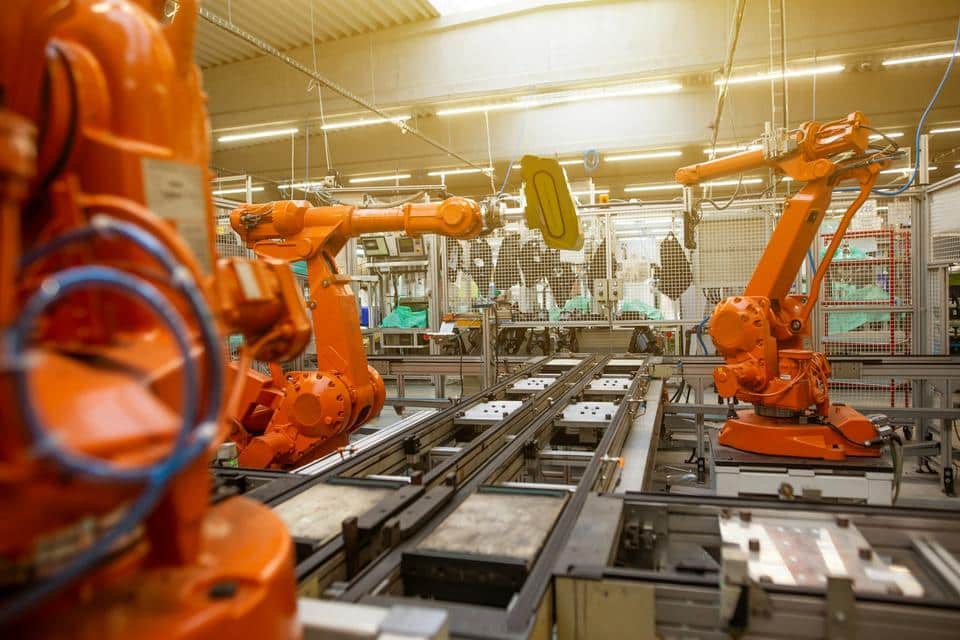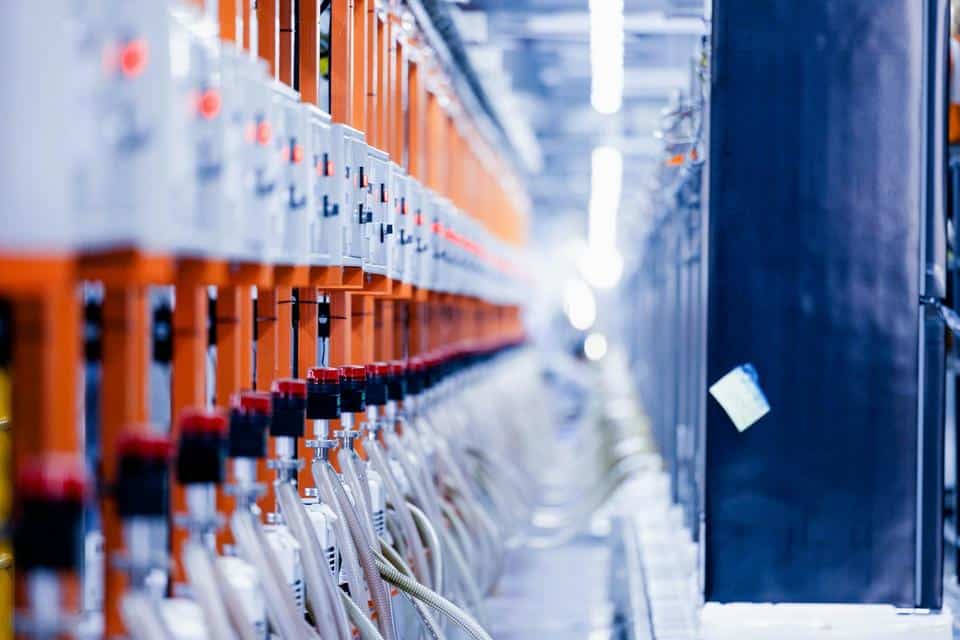Industrial AI is a specialized branch of artificial intelligence that’s meant to meet the needs of certain industries like logistics, manufacturing, and energy. Industrial AI is more focused on improving operations and automating work processes like optimizing production in factories and plants.
What sets industrial AI apart from traditional AI is its ability to work with data from sources like sensors, machines, and systems to make decisions in real time that help with predictive maintenance and reduce downtime. Unlike traditional AI, industrial AI can address the complexities of industrial environments and handle things like safety regulations, heavy machinery, and specific workflows.
In this post, we’ll take a closer look at the ins and outs of industrial AI, its key components, applications, benefits, challenges, and how technology like aiOla is combining industrial and speech AI.
Key Components of Industrial AI
At the core of industrial AI lie several technologies that work together to create smarter, more efficient operations. Here’s a brief overview of core industrial AI components:
- Machine learning (ML): ML models can analyze huge quantities of data from equipment using sensors to identify patterns and predict outcomes such as equipment failures or production delays
- Deep learning: As a more advanced form of ML, deep learning is used in industrial environments for tasks like image recognition to spot defects and anomalies and to help automate complex processes
- Computer vision: This technology allows machines to “see” what’s in front of them, also helping in the anomaly detection process and in visual inspections for stronger quality control
- Natural language processing (NLP): NLP is what allows machines to understand and communicate in human language, making it easier to interpret language, generate reports, and interact with humans
Together, these technologies can optimize industrial processes and streamline operations while at the same time reducing opportunities for human error and cutting out a lot of downtime.

What Are Some Applications of Industrial AI?
Using industrial AI is all about leveraging advanced AI systems to automate and improve industrial processes. The goal is to make operations smarter and more efficient in order to make the most of resources and manpower. Many top industrial AI companies are paving the way by developing AI solutions that handle everything from maintenance to supply chain management. Here’s a quick look at some core industrial AI applications:
- Predictive maintenance: AI systems can analyze data from equipment and sensors to spot early signs of potential failures before they happen. AI is also being used to create digital twins to improve the performance of machinery and its components. This way, companies can schedule maintenance proactively and encounter less downtime and lost costs.
- Quality control and inspection: Thanks to computer vision, AI can find defects instantly during production, helping teams make automated decisions about quality to ensure consistency and speed up inspection processes without human intervention.
- Supply chain and logistics: AI can predict demand, optimize shipping routes, and manage inventory levels to help companies work more efficiently throughout their supply chain. By using AI, businesses may experience fewer delays and better manage their resources.
- Robotics and process automation: AI-driven robots can take over repetitive and manual industrial tasks like assembly and packing. By allowing more space for collaboration on these types of tasks between employees and machines, workers can focus on more complex and strategic tasks.
- Energy management and efficiency: Industrial AI can play a role in reducing energy consumption in plants by helping teams more accurately monitor and adjust energy levels in real time. This can reduce waste, lead to cost savings, create more sustainable practices, and help businesses remain energy-compliant.
Advantages and Challenges of Industrial AI
Industrial AI comes with a list of benefits that help companies work smarter and more efficiently. However, that’s not to say that implementing new AI technologies doesn’t come without its challenges. Here’s a look at both the benefits and challenges of using this new technology.
Key Advantages of Adopting Industrial AI
- Operational efficiency: AI can help streamline work procedures, cut down on waste, and optimize production lines to run smoother
- Cost savings: Lower maintenance and operational costs by using AI to prevent issues before they arise
- Enhanced safety: AI models can assess risks and monitor safety to reduce accidents and make the workplace safer
- Sustainability: AI supports companies’ environmental goals by optimizing energy use and cutting costs
- Decision-making: By providing deep insights from large datasets, AI can help leaders make data-driven, informed decisions
- Reduced downtime: Predictive maintenance and real-time monitoring can minimize equipment failure and keep production running with fewer interruptions
Challenges of Implementing Industrial AI
- Data quality and accessibility: Collecting usable, reliable data from complex systems to inform AI tools can be difficult
- Integration with legacy systems: AI doesn’t always play well with non-digital equipment or older technology, making integration tricky
- Workforce skill gap: Educating employees to use AI to its highest capacity can take time and significant investment in training
- Security and privacy: AI systems need to be highly protected from cyber threats so that sensitive data stays private
- Scalability: Expanding AI solutions across multiple locations, departments, and sites can be challenging in larger operations

Which Industries Stand to Benefit Most from Industrial AI?
Industries across the board can take advantage of emerging AI technologies to improve their business operation. Let’s take a quick look at a few fields where industrial AI can have a major impact:
- Manufacturing: AI is powering smart factories, better production planning, automated inspections, and building smarter products
- Automotive and aviation: AI can streamline production processes and enhance safety measures
- Food and beverage: Everything from quality assurance to inventory management can be optimized with AI
- Logistics and supply chain: AI-driven forecasting and route optimization can improve delivery times
- Pharma and healthcare: AI supports automated production monitoring and assists with regulatory compliance
- Hospitality: AI can improve behind-the-scenes hospitality operations like managing staff scheduling and guest services
aiOla: Combining Industrial AI and Speech Solutions
By combining AI systems that use deep learning, computer vision, NLP, and other technologies with speech AI, companies can boost productivity and work even more efficiently. Speech AI like aiOla allows employees to speak as usual while AI technology automates workflows, captures essential data, and triggers actions.
aiOla can detect over 120 languages including many different accents and dialects as well as understand business-specific jargon in any acoustic environment, making it fitting for industrial businesses like manufacturing and logistics. Using aiOla’s speech AI technology, companies have been able to:
- Decrease inspection time by 45%
- Reduce manual operations by 90%
- Cut down on compliance risk by 20%
- Increase data visibility by 100%
The best part is that aiOla is easy to implement: with virtually no learning curve and a quick adoption process, your team can get started with aiOla in no time so that you can quickly harness the power of AI in your operations.
Is Your Company Ready for Industrial AI?
If your business has yet to adopt new AI tools, now is the time. To remain competitive, maximize manpower and resources, and offer the best service to your customers, implementing new AI technologies is essential. With aiOla’s speech AI technology, you can easily improve operations and maximize other new systems in your tech stack just by speaking naturally.
Schedule a call with one of our experts to see how aiOla can help you optimize industrial AI technologies.


